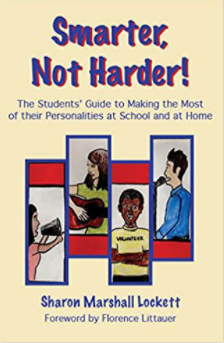“My History teacher hates me.”
“My English teacher has it out for me.”
“My science teacher wants me to fail.”
I believe that we have all, at one point in our lives and educational experiences, had a teacher whom we were convinced didn't like us! As students ourselves we likely thought this about a particular teacher or professor, and now we hear it from our own high school-aged children.
This feeling of tension or being at odds with a teacher can be discouraging and even damaging to success in the class. A student who feels this way is inclined to shut down and withdraw from the class, just bide their time, take their D- and be done with the class and that teacher. This could result in a significant loss of learning, leave an undiscovered passion dormant, and make for an indelibly negative experience for a student.
While there may be an extremely rare occasion in which a teacher or professor truly dislikes a student and “has it out for them,” I am much more inclined to believe that such scenarios are due in large part to differences in and misunderstandings caused by temperament. In reality, it is far less likely that the teacher dislikes you, but rather, your temperaments expressed through your personalities may create tension.
As beings made in the image of an infinite God, we have each been given unique characteristics in that infinite image. These not only help us better understand how we are wired but also how others are wired as well. Encouraging our teens to identify and research their temperament will help them discover more of who God made them to be and perhaps even provide explanation as to why they respond to people (in this case specifically, teachers) the way that they do.
With a deeper understanding of temperament and personality, we can perhaps flip the script of the long-standing narrative, “My teacher hates me.” Instead, we can offer an alternative, a different approach that can empower our teens with tools to put them in control over their grades and their relationships with teachers. With a basic understanding of temperament, our students can begin to understand what their teacher might need, so that they can experience success in the classroom. And, our teens may end up with a friend for life!
This process of empowering starts with a basic understanding of temperament.
What is temperament?
Temperament and personality are often used interchangeably, but they are not one in the same.
Each semester that I teach study skills, my students and I spend a fair amount of time delving into temperament and how it impacts us (in the classroom, on the field, at home—everywhere!). One of the most useful resources I’ve found on this topic is a small book called Smarter, Not Harder! written by long-time educator and author Sharon Marshall Lockett. In it, she defines temperament as follows: “Your temperament is what you are born with; your personality is how you express it; and your character is what you do with it.”
The ancient Greek physician Hippocrates (regarded as the father of medicine) is credited with introducing a theory of four distinct temperaments common to all humanity. His theory, though further developed over time, is still used today to discuss temperament. You may be familiar with the four temperaments he identified and are still used in modern temperament theory: melancholic, sanguine, phlegmatic, and choleric.
How can understanding temperament be helpful in the classroom?
It’s unlikely that each of our teens’ teachers will have their temperament plastered to the classroom wall. And we can’t conduct our own formal temperament questionnaire with them. But, in becoming generally familiar with the four temperaments (reading basic descriptions, for example), our students will likely begin recognizing common characteristics of one of the temperament types in each of their teachers. As this happens, this may begin to transform their classroom interactions.
For example, if your teen is a sanguine type (charismatic, social, active, talkative) who has a melancholic (analytical, introverted, detail-oriented) English teacher, the student may experience that class (and teacher!) as boring, too serious, and challenging—but much of that sentiment may be based in temperament differences rather than academic interest or ability!
Or if your teen is a phlegmatic type (easy-going, quiet) who finds himself in the science classroom of a choleric (dominant, result- and detail-oriented) Biology teacher, the student may feel that their teacher is too overbearing and demanding. Again, such a scenario has little to nothing to do with a student’s potential or capability and much more to do with personal, temperament-based hard-wiring.
In empowering your teen to know their own personality type and think carefully about that of their teachers, your student will have a better idea of which teachers to crack jokes with, which teachers may expect highly-detailed work, and more.
How can I help my teen navigate relationship difficulties with a teacher?
If you notice your teen echoing a complaint that sounds something like "my teacher hates me," that's a great time to engage them in conversation. If they don't readily offer an explanation as to why they feel that their teacher hates them, that's a great starting point in the conversation. As parents of teens, listening engagingly and attentively when they feel like talking (about anything!) is paramount. This is especially true when navigating clashes with teachers.
If your teen doesn't already know their own temperament type, there are several free online questionnaires available to determine and learn about temperament. Continue the conversations with your teen as they explore this for themselves, and ask temperament-oriented questions of the teacher(s) with whom they are clashing. It may even be helpful to use their new-found knowledge to identify your (the parent's) personality type. This may also go a long way in parent-child interactions.
Dig Deeper
The following are a few helpful resources that I share with my students and their parents during our study skills course:
 A free online questionnaire with explanations provided for each temperament type
A free online questionnaire with explanations provided for each temperament type
 Another free online questionnaire
Another free online questionnaire
 This is the booklet used in my studies skills class to discuss temperament. It includes its own assessment at the end, and detailed but relatable descriptions, scenarios, and more--written specifically for youth.
This is the booklet used in my studies skills class to discuss temperament. It includes its own assessment at the end, and detailed but relatable descriptions, scenarios, and more--written specifically for youth.
/Logos/Horizontal%20Academic%20Logo%20for%20Light%20Backgrounds.png)
/Logos/Horizontal%20Academic%20Logo%20for%20Dark%20Backgrounds.png)

.jpg?width=100&height=100&name=Copy%20of%20Blog%20Authors%20(7).jpg)

